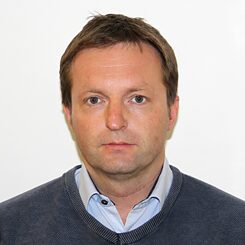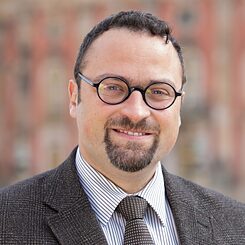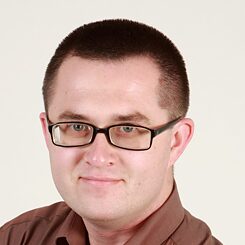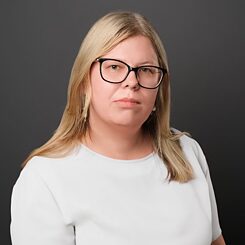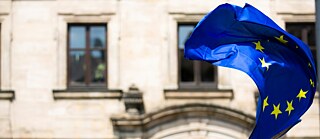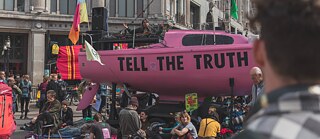Safety and Security
Central Europe’s security two years into Russia's war in Ukraine
By PERSPECTIVES NewsroomRussia’s full-scale invasion of Ukraine has radically changed the security climate in Eastern and Central Europe. We asked local experts from Lithuania, Germany, Czech Republic and Slovakia to learn more about this new reality as we approached the second anniversary of February 24.
The questions for the experts were these:
- Which steps were taken towards strengthening the security of your country since Russia‘s full-scale invasion of Ukraine?
- Which steps are planned to be taken in the future and how are these changes affecting your society?
Here are the answers:
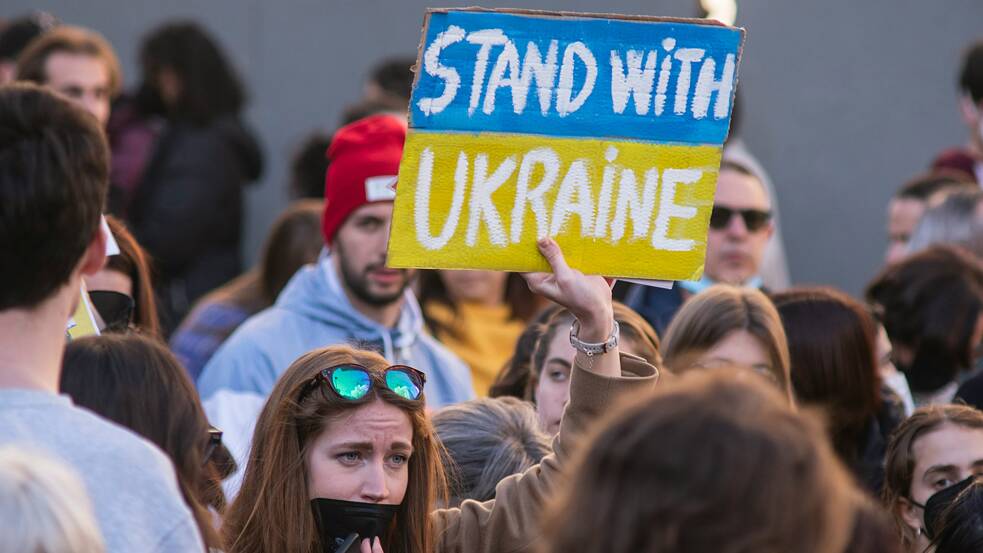
Survey: Central Europe’s security two years into Russia's war in Ukraine | Photo: Key Visual 'Survey: Central Europe’s security two years into Russia's war in Ukraine' © Edoardo Ceriani on Unsplash
Czech Republic
MARTIN SVAROVSKY is a security policy analyst and Konrad-Adenauer-Stiftung Senior Fellow.- The Czech Republic is an integral part of the NATO Eastern Flank. Before the war, countries on the NATO Eastern Flank have been expressing their specific strategic concern.
Looking from this pre-war perspective, we can be satisfied with the decisions made at the NATO Madrid summit after the outbreak of the war. A move from forward presence to forward defense, from air policing to air defense, and deploying brigade-size formations to the Eastern Flank, all point in the right direction. Approval of the three regional plans at the NATO Vilnius summit in 2023 will also strengthen the interoperability of the forces on the Eastern Flank with other NATO capabilities.
From a military point of view, the Czech Republic can be satisfied. Still, the West needs to review its strategic thinking in addition to a tactical military response. After the war, we should employ empathy-driven analysis to understand what the adversary thinks of us.
Any adversary of the West will take several lessons from this war:
A persistent level of disunity in the West. Looking at NATO or EU summits, Western cohesion seems fine. Nevertheless, when considering the details, member states exhibited a diversity of threat assessments. Recall those opposed opinions on which weapon system is escalatory and which is not. EU member states were not able to agree on sanctions for Russians for a quite long time, which enabled the Russian economy to adapt.
Western society exhibits a high degree of fear. For two years, the Kremlin observed how fear of COVID-19 effectively paralyzed the entire world. During the war, this fear transformed into anxiety about armed conflict and the use of military power. Western society today is different from the 1990s. The Srebrenica massacre led to NATO military action, but the horrors of Mariupol did not; something any adversary will reflect in its calculus.
- A reluctance among decision-makers to take risks. Media and policy advisers, rather than security experts or intelligence officers, too often establish what politicians regard as risky. The true risk of a limited no-fly zone over Western Ukraine or an airlift to Mariupol was political and not military.
Within this context, I assume that the task of the adversary’s military planners will be to initiate operations that would leave the Western leaders with the dilemma of whether or not to fight. In the future, NATO members might witness an air or naval blockade, or a quick assault followed by a rapid withdrawal of aggressor forces. All these are well below NATO’s Article 5 threshold.
In times of crisis, it is the politicians and not the chiefs of staff who decide about the use of military power. Therefore, a purely military response to the Russo-Ukrainian War is not enough. We must give greater consideration to the psychological side because perception is what triggers action.
Lithuania
PROF. MARGARITA ŠEŠELGYTĖ is a director of the Institute of International Relations and Political Science of Vilnius University.- Lithuania has lived in quite a precarious security situation since the reestablishment of its independence. Russia has been weaponizing all interdependences that existed between Lithuania and Russia, including economy and energy. It was also conducting various influence operations directed against the Lithuanian state to dismantle social cohesion and hurt the political system.
Our security situation has been degrading ever since, and not only in the information, cyber sectors but also in the military domain. Russia has continuously built up its armed forces and its concentration in the region was outmassing NATO forces, in which case the defence of Baltic countries would have been particularly complicated. Russia clearly demonstrated its will to use these forces in 2008 in Georgia, and 2014 in Ukraine. These changes affected our security calculations, defence spending gradually increased, conscription was reintroduced, NATO Enhanced Forward Presence battalion was deployed in Lithuania.
The war in Ukraine in 2022 has changed the security assessment in the region in the most dramatic way. As Russia demonstrated not only a willingness to use armed forces but did not shy away from a massive conventional attack, also expanding its military presence in Belarus which shares more than 700 hundred kilometers of border with Lithuania. These drastic changes required an adequate response.
- Arguably, there were two directions of Lithuanian response: international, working through NATO, new defence plans reacting to the changing security environment were affirmed at the Vilnius NATO summit. Lithuania has also been working together with Germany to ensure that additional forces in the framework of Enhanced forward defence would be deployed in Lithuania. Lithuania is heavily investing in the capacity to host these forces. New security assessment also had an effect on defence acquisition, strengthening prevention and response to information and cyber-attacks. Lithuania is already spending more than 2 percent of its GDP on defence. The last agreement of political parties, committed to keeping defence spending not less than 2.5 percent of GDP. There was an expansion of the list of conscripts.
Last but not least, Lithuania is among the countries contributing the most to the aid in Ukraine, in terms of percentage of GDP, thereby trying to prevent Russian threats from coming closer to NATO borders.
Germany
DR. CHRISTIAN E. RIECK is Senior Lecturer and Academic Coordinator at the Chair of War Studies at the University of Potsdam.- Objectively, Germany's security situation has changed fundamentally since the Russian aggression against Ukraine. Conventional war has returned to Europe, but unlike during the Cold War, Germany is no longer a frontline state. This leads to cognitive dissonance in Germany: on the one hand, the “Zeitenwende” (historic turning point) in German security policy has set a great deal in motion, especially in the stationing of German soldiers in the Baltic states and in the equipping and arming of the Bundeswehr through the special fund of 100 billion euros - even if the pace of reform is still too slow. Germany is now the second most important supporter of Ukraine, both in military and civilian terms. Germany is now also investing again in civil defence, which has been neglected for a long time.
- On the other hand, the majority of German society still does not seem to want to recognise the danger posed by the war against Ukraine. For too many, the war still seems too far away and, unlike in Poland for example, there is a diffuse sense of security that NATO under American leadership will successfully deter Russia. But the alliance can only be as strong as its members. NATO, that's all of us.
Slovakia
ANDREJ MATIŠÁK is a Slovak journalist, he writes about European politics, international relations and global security.- Slovak security does not exist in some theoretical apolitical vacuum. A NATO and European Union club card or/and the purchase of F-16 fighters are not enough for the country to secure its safety. The current government coalition (Smer, Hlas, SNS) can believe that at some point its lukewarm attitude towards Ukraine will be adopted by other allies as well. However, this is not the case yet, and all the populist shouts such as - There is no war in Kyiv - are extremely unhelpful. They make Slovakia a partner that many are shaking their heads over. Does Slovakia want to get into a situation where someone asks why die for Košice? Most probably not. But hope is not a security strategy.
The fact is that without the full-scale Russian invasion of Ukraine, Slovakia would not have a multinational NATO battlegroup. It will be even transformed into a brigade, which means that its military capabilities should be further strengthened. Slovakia clearly gained from supplying old Soviet military technology to Ukraine. Based on this, the Slovak armed forces are now receiving, for example, German Leopard 2 tanks. At the same time, it is very beneficial to have such a battle group in terms of joint military exercises and interoperability.
- By hosting our partners, Slovakia gained another level of security based on collective defense within NATO. This is also related to the fact that the allies ensure the protection of the country's airspace, though the delay of the ordered American F-16 fighters contributes to this situation.
However, Slovakia definitely needs to strengthen its air defense. Keeping the S-300 system that was provided to Ukraine, would not solve this problem. It was perhaps a bit shortsighted that the supersonic jets were given priority over air defense in the past.
To sum it up, it sounds like a paradox but the Russian war helped the Slovak Armed Forces to finally really move from the Soviet-style military systems to the modern equipment. It also strengthened Slovak military links to its partners that are now physically providing security for the territory of Slovakia. At those levels, in a way, Slovaks can feel safer than before February 24th, 2022.
But it remains to be seen how Slovakia will behave at the more strategic and political level.
Lithuania
RASA MILERYTĖ is a journalist from BENDRA.lt and a poet.- The Lithuanian cultural phenomenon of the year is that writers are raising support for Ukraine.
“We understand that many of you have already donated and are donating to various foundations, but winter is approaching, the country's infrastructure is under attack, Ukrainian cities are sinking into darkness, and people are constantly being left without heating and water. They need help”, - these are the words that Marius Burokas, Laurynas Katkus and Donatas Petrošius, members of the Lithuanian Writers' Union, addressed to the public in November 2022. They have launched a fundraising initiative to support Ukrainian soldiers and specific struggling writers and their families.
Having experienced several decades of Soviet occupation, Lithuania knows how important the role of artists is in defending freedom. Artists in Ukraine are joining the armed forces and fighting on the frontline, actively communicating with Western societies, and their testimonies are spreading around the world. Artists who, in a normal world, would be able to create are dying today.
Lithuanian artists are making their contribution too: not only by raising support, but also by sharing news and analytical articles faster than the media, reminding us every day how important it is not to succumb to the so-called war fatigue.
Part of society looks at artists with a wry smile – as at those who live in a world of their own ideas, far removed from reality. This is both a romanticised and hurtful attitude, as if a work of art has less value than a product produced by a business. But while some businesses cannot leave Russia, it is the artists who are defending democracy by retreating from their usual activities.
- The above-mentioned writers' campaign continues. On several occasions, writers have travelled to Ukraine and transported items for the defending country, bought with the donations. And isn't this a strange world? At the Book Awards in January 2024, the Phenomenon of the Year was not a flashy festival or an exceptional book, but a strong expression of civic stance: a campaign to support Ukraine launched by the Lithuanian Writers' Union was awarded for its social activities that go beyond the boundaries of texts and for promoting solidarity among the literary community.
